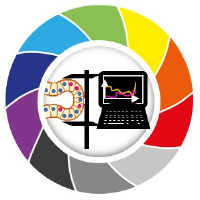Mini-Sabbatical Experience at Bia-PoL#
Friederike Kessel, February 28th 2022
Hello, my name is Rike. For the last four years I have been a PhD student in experimental nephrology at the University Hospital Carl Gustav Carus in Dresden. During this time I started diving into the possibilities of bioimage analysis with Fiji. By using the ImageJ Macro language I helped colleagues to automatize workflows for the quantification of fluorescent signals in histology and intravital microscopy in mice.
I contacted Robert at the BiAPoL because I was looking for something different, interesting to do for a short time between finishing my PhD and starting a new job as PostDoc in the field of neuroregeneration. Surprisingly, he already had the concept of a mini-sabbatical for this kind of scenario in mind – so for four weeks in November 2021 I joined him and his group for some exploration in the field of bioimage analysis.
After some general brainstorming with Robert about what I was interested in, plus what might actually be relevant for my future position, I got started. I got a desk in the office together with Marcelo and Johannes. Everyone was very supportive and I could simply try and get into new plugins – just the things I never had the time or headspace to fully explore during my PhD. The main new topics included the general use of GitLab for project specific communication, tracking of cells in 4D with Trackmate and Mastodon in ImageJ, setting up and using Napari (for the first time) for segmentation of cells with StarDist 3D, including unsupervised clustering of these datasets with the napari-clusters-plotter. Although halfway through the sabbatical the pandemic situation in saxony drastically worsened and everyone was eager to work from home again, the regular coffee breaks in online meetings still made me feel like I was part of a team. I am very grateful for Robert’s, Marcelo’s and Johannes’ time, patience and the expertise they willingly shared with me.
In conclusion I can only say: A mini-sabbatical, especially in a non-pressure environment, is the prefect way to gain new perspectives and connect with other scientists. I definitely recommend the general concept itself, and Robert’s group specifically - for anyone, from students to group leaders. I really hope that I will be able to repeat this experience in the future.
